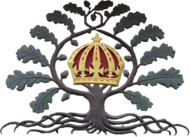Sir Roger L'Estrange | |
|---|---|
 Portrait of L'Estrange by John Michael Wright, c. 1680 | |
| Member of Parliament for Winchester | |
| In office 1685–1689 | |
| Personal details | |
| Born | 17 December 1616 Old Hunstanton |
| Died | 11 December 1704 (aged 87) |
| Nationality | English |
| Political party | Tory |
| Relations | Hamon le Strange (father) Hamon L'Estrange (brother) |
| Alma mater | Sidney Sussex College, Cambridge |
| Occupation |
|
| Military service | |
| Allegiance | English Royalist |
| Part of the Politics series on |
| Toryism |
|---|
 |
Sir Roger L'Estrange (17 December 1616 – 11 December 1704[1]) was an English pamphleteer, author, courtier and press censor. Throughout his life L'Estrange was frequently mired in controversy and acted as a staunch ideological defender of King Charles II's regime during the Restoration era. His works played a key role in the emergence of a distinct 'Tory' bloc during the Exclusion Crisis of 1679–81. Perhaps his best known polemical pamphlet was An Account of the Growth of Knavery, which ruthlessly attacked the parliamentary opposition to Charles II and his successor James, Duke of York (later King James II), placing them as fanatics who misused contemporary popular anti-Catholic sentiment to attack the Restoration court and the existing social order in order to pursue their own political ends.[2] Following the Exclusion Crisis and the failure of the nascent Whig faction to disinherit James, Duke of York in favour of Charles II's illegitimate son James, 1st Duke of Monmouth, L'Estrange used his newspaper The Observator to harangue his opponents and act as a voice for a popular provincial Toryism during the 'Tory Reaction' of 1681–85. Despite serving as an MP from 1685 to 1689 his stock fell under James II's reign as his staunch hostility to religious nonconformism conflicted with James's goals of religious tolerance for both Catholics and Nonconformists. The Glorious Revolution of 1688 and the collapse of the Restoration political order heralded the end of L'Estrange's career in public life, although his greatest translation work, that of Aesop's Fables, saw publication in 1692.[3]
- ^ Lee 1893.
- ^ L'Estrange, Roger (1678). An account of the growth of knavery under the pretended fears of arbitrary government and popery... London.
- ^ L'Estrange, Roger (1692). "Fables of Aesop and other eminent mythologists".